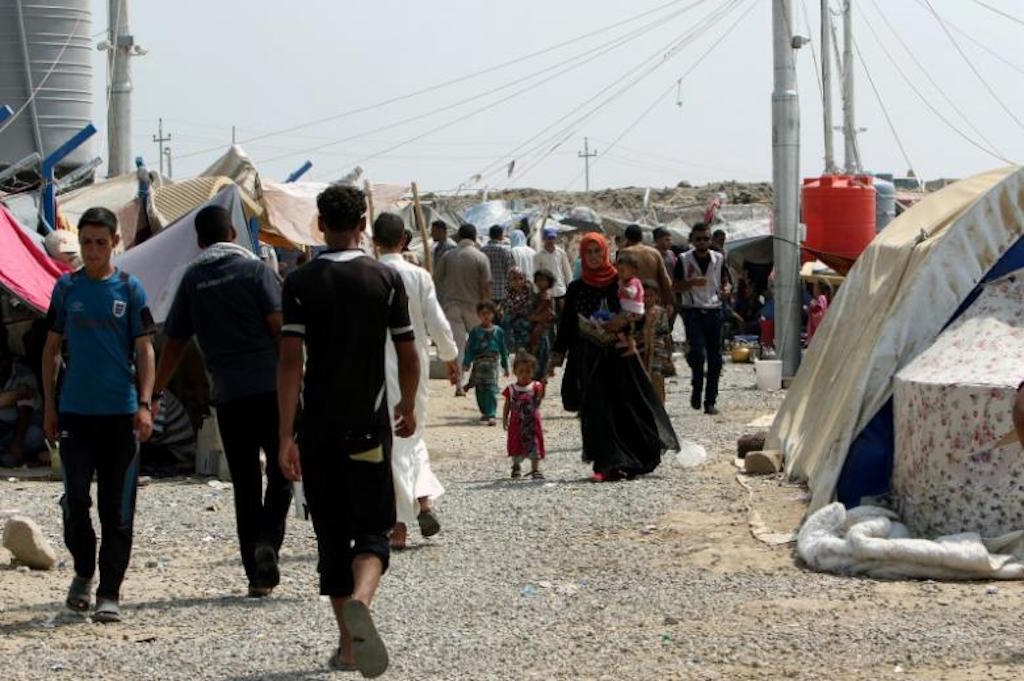Khazer – Boshra Mohammed got married two years ago in her hometown. She became pregnant last spring. But, as far as the Iraqi government is concerned, she is still single and her son doesn’t exist.
Boshra is one of thousands of Iraqis liberated from ISIS’ control after two years of living under its rule only to find themselves facing legal problems.
The Iraqi government doesn’t recognize neither her marriage nor her son’s birth certificate issued by the militants.
Reuters reported that the government is working to reverse the bureaucratic legacy of ISIS, which subjected millions to its rule after seizing large parts of Iraq during the summer of 2014.
At a makeshift court housed in one of the cabins at a displaced camp in Khazer near Mosul, governmental officials are busily converting certificates issued by the self-declared caliphate into official government documents.
“We are changing them so that we can feel like citizens again,” Boshra, 20, admitted.
Despite the violence and deprivation they endured under ISIS rule, life went on normally in Mosul and other areas controlled by the militants: people married, had children, divorced and died.
Outside the court, displaced Iraqis held their ISIS issued documents as proof of their status, and the complicated bureaucracy the militants enforced in their ambition to create a state.
Judge Khalid al-Shammari, whose suit and tie didn’t match the cabin he was in, said that the government doesn’t recognize ISIS procedures.
“We are emergency judges, like emergency doctors. These are extraordinary circumstances,” he explained, adding that: “sometimes one is liberated and the other is still in an area controlled by ISIS.”
The procedures to register deaths are particularly strict to prevent people taking advantage of the chaos to fake their own deaths so they can escape justice, or claim inheritances before time, the judge said.
Marwa Salem is running up against those obstacles as she tries to register the death of her father, who she said was killed by ISIS for cooperating with the Kurdish security services.
Marwa related that militants dumped her father’s body on the outskirts of the village where they lived near Mosul and gave his family his death certificate. Before his death can be recognized by Iraqi authorities, she must take the case to another court that deals with terrorism cases in a different city. But people in camps are not permitted to leave for now.
In the beginning, some people converting their documents tried to avoid ISIS’ bureaucracy but ended up having to comply to it.
Abu al-Abbas, 22, got married shortly after ISIS took control over Mosul. Instead of going to the court of the terrorist organization, he arranged for a religious cleric to preside over the wedding ceremony.
Abu al-Abbas’ neighbor also tried to avoid ISIS’ procedures, but militants found out and they flogged as punishment.
Fearful of being discovered himself, Abu al-Abbas went to an ISIS court where a judge tested his knowledge of Islam before signing off on the marriage.
“Their way was the only way,” Abu al-Abbas said, as he stood in line outside a cabin to register his marriage again.
The judges and their staff hope they will soon be able to return to Mosul as Iraqi forces advance.
A judge’s assistant said that everything is available in Mosul, unlike being in a caravan.
Two non-governmental organization, Qandil, a Swedish group that works mainly in Iraq’s autonomous Kurdistan region, and the Norwegian Refugee Council are helping with the process.
As for couples registering their marriage for the first time, their fingerprints have to be taken. Then they are called into another cabin where a judge with two witnesses present asks for their dates of birth, when they married and the dowry. The couples step out into the camp and wait for their Iraqi documents to be processed, meaning they can cancel ISIS documents and begin a new life.
